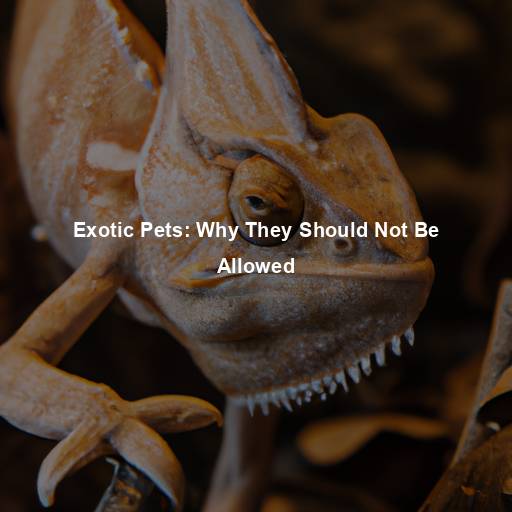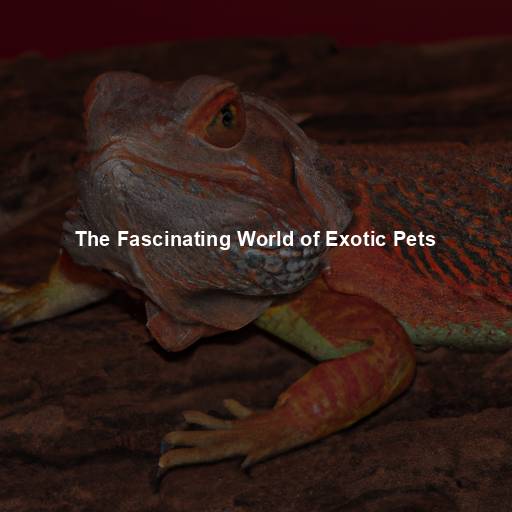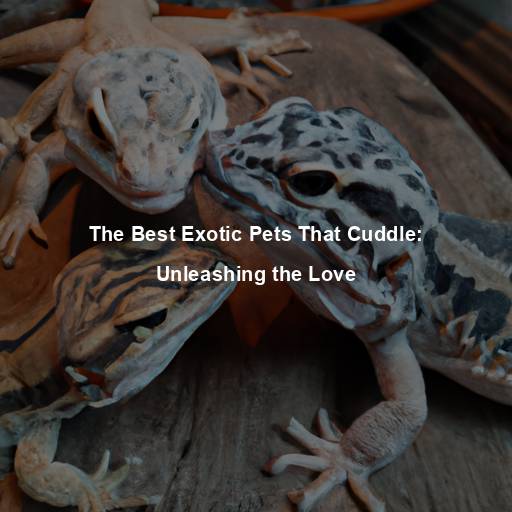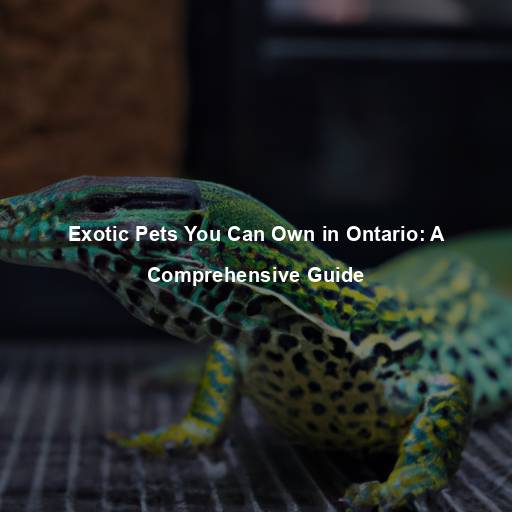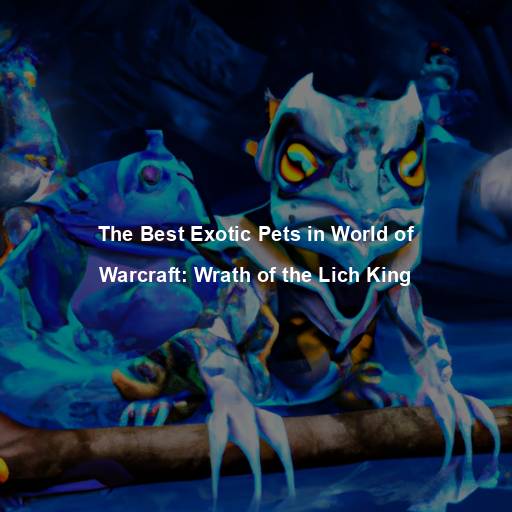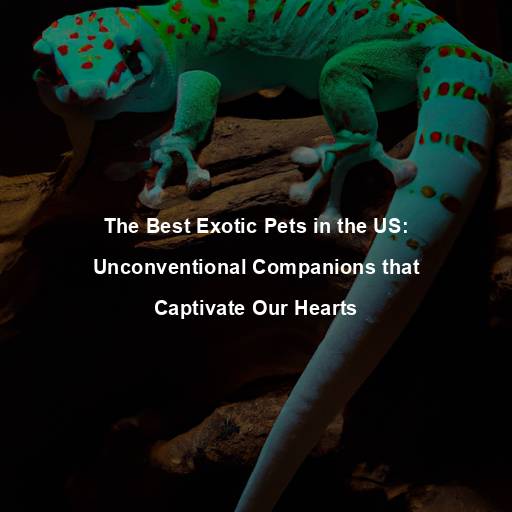Exotic Pets: Why They Should Not Be Allowed
Last Updated on July 22, 2023 by Evan
Contents
of Disease
In addition to the environmental impact caused by invasive species, exotic pets can also introduce new diseases to native wildlife populations. Some exotic animals may carry pathogens that can be transmitted to local species, leading to the spread of diseases and potential epidemics. For example, the introduction of the chytrid fungus, carried by African clawed frogs, has caused devastating declines in amphibian populations worldwide. By prohibiting the ownership of exotic pets, we can mitigate the risk of introducing harmful pathogens into our ecosystems.
Habitat Destruction
The trade and ownership of exotic pets contribute to the destruction of natural habitats. The demand for these animals often leads to widespread habitat destruction through deforestation, logging, and land conversion, as their native habitats are often destroyed to make way for capturing and breeding facilities. This loss of habitat not only affects the exotic species themselves but also impacts countless other plant and animal species that depend on these ecosystems for their survival. By discouraging the ownership of exotic pets, we can help protect these fragile habitats from further destruction.
Safety Concerns (continued)
Risk of Injury
Keeping exotic pets, especially those known for their large sizes or aggressive nature, can be a real challenge in terms of safety. Despite being well-trained and handled appropriately, these animals possess innate instincts and unpredictable behaviors that make them potentially perilous. Unfortunately, it’s not uncommon to hear about incidents where exotic pets have attacked or harmed humans, sometimes with tragic consequences. By advocating for a ban on owning such animals, we prioritize public safety and strive to minimize the occurrence of these unpredictable and potentially devastating incidents.
Financial Burden
Owning an exotic pet comes with considerable financial responsibilities. These animals often require specialized diets, veterinary care, and enclosures that can be costly to maintain. Many exotic pets have long lifespans, which means that owners must be prepared to provide for their needs for many years to come. Unfortunately, some individuals may underestimate the financial commitment required or find themselves unable to meet these obligations, resulting in neglect or abandonment of the animals.
Disruption of Natural Behaviors
Exotic pets often exhibit complex behaviors that are difficult to replicate in a domestic environment. For example, many primates require social interactions with their own species to thrive, while certain exotic birds need ample space for flying and engaging in natural behaviors like foraging. By keeping these animals in captivity, we deprive them of the opportunity to express their natural instincts and behaviors, leading to frustration, stress, and compromised welfare.
Lack of Rehabilitation and Release Programs
It’s a perplexing and concerning dilemma – when exotic animals are taken from their owners or willingly surrendered, their fate hangs in the balance. Sadly, the lack of well-designed rehabilitation and release programs often leaves these creatures in a state of uncertainty, as they find themselves living in subpar conditions within sanctuaries or zoos. The question arises – are we truly providing them with the care and environment they desperately require? By advocating for a ban on owning exotic pets, we can redirect our attention and resources towards comprehensive rehabilitation initiatives that strive to reintroduce these animals back into their natural habitats, where they rightfully belong.
Environmental Impact (continued)
Threat to Native Species
Exotic pets can pose a direct threat to native species through predation, competition for resources, and the transmission of diseases. In some cases, they may outcompete local species for food or nesting sites, leading to population declines or local extinctions. The introduction of non-native predators into ecosystems can have devastating effects on indigenous wildlife, disrupting the delicate balance of predator-prey relationships. By preventing the ownership of exotic pets, we can help protect native species and preserve the integrity of our ecosystems.
Habitat Fragmentation
The allure of exotic pets is undeniably captivating, but let us untangle the perplexing web of consequences that lie beneath their ownership. A veil of burstiness surrounds this trade, for it is not just a matter of personal choice, but one that spills into the delicate tapestry of our natural world. Mystifyingly, as these animals are sourced from regions far and wide, we unknowingly contribute to habitat fragmentation and the ensuing turmoil it brings. With each capture and breeding, the once-pristine landscapes become fragments of a bewildering puzzle, leaving native species in a state of bewilderment as they struggle to find solace in fractured habitats.
Public Perception and Stereotyping
Allowing the ownership of exotic pets can perpetuate misconceptions and stereotypes about these animals. While some individuals may have the knowledge and experience to care for these creatures responsibly, many others may not fully understand their needs or the potential risks involved. Incidents involving exotic pets can result in negative media attention and public backlash, further fueling the perception that these animals are inherently dangerous or unsuitable as pets. By prohibiting their ownership, we can promote a more informed and responsible attitude towards these animals, focusing on their conservation rather than their domestication.
Conservation Education
Banning the ownership of exotic pets can create an opportunity to redirect resources towards conservation education and awareness programs. By educating the public about the importance of protecting wildlife in their natural habitats, we can foster a deeper understanding of the complex ecological relationships that exist and the need for conservation efforts. This knowledge can inspire individuals to support conservation organizations, engage in sustainable practices, and advocate for the protection of endangered species. Ultimately, conservation education plays a vital role in ensuring the long-term survival of our planet’s diverse wildlife.
FAQs: Why Exotic Pets Should Not Be Allowed
What are exotic pets?
Exotic pets generally refer to animals that are not commonly kept as pets, such as snakes, monkeys, big cats, and various reptiles and birds. These animals typically come from the wild and have specific environmental, dietary, and social needs that can be challenging to meet in a domestic setting.
Why should exotic pets not be allowed?
Owning an exotic pet may seem enticing, but behind the allure lies a perplexing truth: they are simply not suited to the average owner’s lifestyle. These animals demand an extraordinary level of care, with a baffling array of dietary needs and habitat demands that can leave even the most well-intentioned owner feeling overwhelmed. The consequences of these challenges are far from trivial – stressed and unhealthy animals grappling with inadequate living conditions and, tragically, all too often meeting an untimely demise. In light of these perplexities, it becomes abundantly clear why the ownership of exotic pets should be carefully scrutinized and heavily discouraged.
Furthermore, the lenient stance on owning exotic pets opens up a Pandora’s box of unforeseen consequences. Not only does it fuel the illicit wildlife market, pushing already vulnerable species to the brink of extinction, but it also perpetuates a cycle of criminal activity that thrives on the exploitation of these beautiful creatures. The perplexing aspect lies in our inability to comprehend the long-term ramifications of our choices. By embracing the allure of owning exotic pets, we unwittingly become enablers of an underground network built on the suffering and demise of these animals.
Additionally, exotic pets can pose significant risks to public safety. Even when initially docile, these animals can become unpredictable and dangerous as they mature. Their natural instincts and physical capabilities can result in serious injuries or even fatal incidents. Furthermore, exotic pets can also introduce zoonotic diseases, potentially spreading illness from animals to humans.
Don’t exotic pets serve as educational tools?
Oftentimes, one might entertain the thought of inviting an exotic pet into their lives under the guise of education. However, it is paramount to recognize that there are alternative avenues of enlightenment readily available. For instance, accredited zoos, wildlife rehabilitation sanctuaries, and educational programs all offer opportunities to glean knowledge about diverse species while upholding the principles of conservation and ethical pet ownership. Prioritizing the adoption of exotic animals solely for educational purposes, without sufficiently addressing their intricate requirements, not only compromises their welfare but also disregards our duty to protect and nurture them.
What is the impact of owning exotic pets on conservation efforts?
The intertwining relationship between owning exotic pets and conservation efforts is a perplexing one. While some may argue that having these unique creatures as companions fosters a connection with the natural world, the truth is far more nuanced. The irrefutable burst of demand for exotic pets unfortunately fuels the dark underbelly of the illegal wildlife trade, perpetuating the distressing decline of precious species in the wild. It is deeply disconcerting that many of these sought-after pets are already grappling with the threat of extinction, and promoting their ownership only exacerbates their precarious plight, impeding the very conservation initiatives seeking to safeguard their fragile ecosystems.
Are there alternatives to owning exotic pets?
Absolutely! Rather than owning exotic pets, individuals can support conservation organizations and initiatives that work towards preserving habitats and protecting species in their natural environments. By prioritizing ecotourism, responsible volunteering, or supporting educational programs dedicated to wildlife, people can contribute to the preservation of exotic species without directly harming or disrupting their well-being.
Furthermore, individuals can opt for traditional household pets, such as dogs, cats, and small mammals, that have been selectively bred for centuries to adapt to human environments. These pets generally have well-established care guidelines, are more readily available, and have traits that make them suitable companions within domestic settings.

